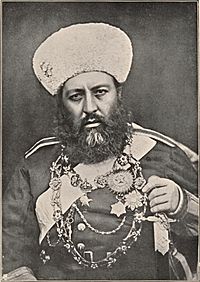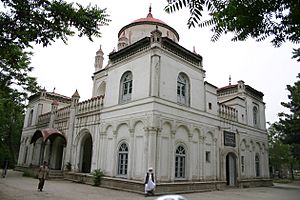Abdur Rahman Khan facts for kids
Quick facts for kids Abdur Rahman Khan |
|||||
|---|---|---|---|---|---|
| Afghan Amir | |||||

Abdur Rahman Khan
|
|||||
| Amir of Afghanistan | |||||
| Reign | 31 May 1880 – 1 October 1901 | ||||
| Predecessor | Ayub Khan | ||||
| Successor | Habibullah Khan | ||||
| Born | 1840–1844 Kabul, Afghanistan |
||||
| Died | 1 October 1901 (aged c. 56–61) Kabul, Afghanistan |
||||
| Burial | 1901 Palace at Zarnegar Park, Kabul, Afghanistan |
||||
| Spouse | Babo Jan | ||||
|
|||||
| Dynasty | Barakzai dynasty | ||||
| Father | Mohammad Afzal Khan | ||||
Abdur Rahman Khan (Pashto/Dari: عبدالرحمن خان) was the Amir of Afghanistan from 1880 until he died in 1901. He is famous for bringing the country together after many years of internal fighting. He also helped create the Durand Line Agreement with British India, which set the border.
Abdur Rahman Khan was the first child and only son of Mohammad Afzal Khan. His grandfather was Dost Mohammad Khan, who started the Barakzai dynasty. Abdur Rahman Khan brought back strong government rule in Afghanistan after the chaos of the Second Anglo-Afghan War. People called him The Iron Amir because he ruled with a very strong hand. He had a powerful army and officials who followed his strict orders. He also used a wide system to keep an eye on everything happening in the country.
His nickname, The Iron Amir, also came from his victories over many rebellions. These revolts were often led by his own relatives. During his time as Amir, there were over 40 rebellions. Abdur Rahman Khan's rule was very strict. He was a great military leader for Afghanistan.
Contents
Early Life and Rise to Power
Growing Up and Learning Warfare
Abdur Rahman Khan was born in Kabul around 1844. He spent much of his younger years in Balkh with his father, Mohammad Afzal Khan. He learned about warfare from an Anglo-Indian soldier named William Campbell.
Family Conflicts and Exile
Before he died in 1863, Abdur Rahman's grandfather, Dost Mohammad Khan, chose his third son, Sher Ali Khan, to be the next ruler. This decision bypassed Abdur Rahman's father, Afzal Khan, and his uncle, Azam Khan. This led to a long and fierce fight for power among Dost Mohammad's sons.
Abdur Rahman was known for being very capable and brave. Even though his father, Afzal Khan, made peace with Amir Sher Ali, Abdur Rahman's actions in the northern part of the country made the Amir suspicious. When he was called to Kabul, Abdur Rahman fled across the Oxus River into Bukhara. Amir Sher Ali then put Afzal Khan in prison.
A revolt started in southern Afghanistan. Abdur Rahman returned to the north, and many troops and armed groups joined him. In March 1866, he and his uncle, Azam Khan, took over Kabul. Amir Sher Ali tried to fight them, but many of his troops left him. Abdur Rahman then freed his father, Afzal Khan, from prison and made him the Amir of Afghanistan.
After more fighting, Abdur Rahman and his uncle defeated Sher Ali's forces again and took Kandahar in 1867. When Afzal Khan died later that year, Azam Khan became the new ruler. Abdur Rahman was made governor in the northern province. However, by the end of 1868, Sher Ali returned, and many people supported him. Abdur Rahman and Azam Khan were defeated in January 1869. Both sought safety in Central Asia, where Abdur Rahman went under Russian protection in Samarkand. Azam died in Kabul in October 1869.
Return to Power
Negotiations with the British
Abdur Rahman lived in exile in Tashkent for many years. He was a strong opponent of the British. In March 1880, news reached India that Abdur Rahman was in northern Afghanistan. The British government, led by Lord Lytton, began talking with him. They offered to pull their troops out of Afghanistan and recognize him as the Amir. However, they wanted to keep control of Kandahar and some nearby areas.
After some discussions, Abdur Rahman met with Lepel Griffin, a British diplomat in Kabul. Griffin described Abdur Rahman as a smart and polite man, good at talking about important matters.
Becoming the Amir
At a special meeting called a durbar on July 22, 1880, Abdur Rahman was officially recognized as the Amir. The British gave him weapons and money. They also promised to help him if any foreign power attacked Afghanistan without reason, as long as he agreed to follow British foreign policy. The British troops then left Afghanistan, and in 1881, they also handed over Kandahar to the new Amir.
However, Ayub Khan, one of Sher Ali Khan's sons, marched from Herat to Kandahar. He defeated Abdur Rahman's troops and took the city in July 1880. This was a big setback for the new Amir. But Ayub Khan was later defeated in Kandahar by the British General Frederick Roberts on September 1, 1880. Ayub Khan had to flee to Persia. After this, Abdur Rahman was firmly in charge in Kabul, thanks to the constant British support with weapons and money. Over the next few years, Abdur Rahman strengthened his control over all of Afghanistan. He put down revolts using his very firm authority. The powerful Ghilzai tribe rebelled against his strict rules several times.
Dealing with Neighbors
In 1885, while the Amir was meeting with the British viceroy, Lord Dufferin, in India, news arrived of a small fight between Russian and Afghan soldiers. This happened at Panjdeh, a disputed area on the northwestern border of Afghanistan. Abdur Rahman showed great wisdom in how he handled this. Even though he was a man of war, he knew that a small border clash was not a good enough reason to ask the British for help. A big war would bring a Russian invasion from the north and force the British to send an army into Afghanistan from the southeast.
His main goal was to keep powerful neighbors, whether friends or enemies, out of his country. He knew this was what the Afghan people wanted. Even though a war with Russia seemed possible for a while, the Amir's calm and careful approach helped prevent it. He left a strong impression on those who met him in India as a clear-thinking leader with great self-reliance. He received an annual payment from the British government and was allowed to import weapons.
He successfully created an organized government in a region known for its fierce and independent people. He used European inventions to improve his army. However, he was against new things like railways and telegraphs that might give Europeans more influence in his country.
He also built several palaces and guest houses, including the Bagh-e Bala Palace and Chihil Sutun Palace in Kabul, and the Jahan Nama Palace in Kholm. The Amir was unable to visit England when Queen Victoria invited him because of his health. Instead, his second son, Nasrullah Khan, went in his place.
Durand Line
Establishing the Border
In 1893, Mortimer Durand was sent to Kabul by the British Indian government. His goal was to sort out land exchanges needed for the border between northeastern Afghanistan and Russian territories. He also discussed other important matters with Amir Abdur Rahman Khan. Abdur Rahman Khan showed his usual skill in diplomatic talks. He was firm about his own views and claims, but he also understood the real situation very well.
The agreement that followed confirmed the relationship between the British Indian and Afghan governments. It also settled the important and difficult issue of Afghanistan's eastern border with India. A special commission was set up to mark the boundary between Afghanistan and British-ruled India. They met at Parachinar, which is now in Pakistan, near Khost, Afghanistan. Mortimer Durand and Sahibzada Abdul Qayyum represented the British side. Afghanistan was represented by Sahibzada Abdul Latif and Governor Sardar Shireendil Khan.
This agreement led to the Durand Line Treaty in 1893. This treaty set the border between Afghanistan and what are now parts of Pakistan. Later, in 1905, Amir Habibullah Khan signed a new agreement with the United Kingdom that confirmed the Durand Line. King Amanullah Khan also confirmed its legality through the Treaty of Rawalpindi in 1919. The Durand Line was again recognized as an international border by Sardar Mohammed Daoud Khan in 1976.
The "Iron Amir" and His Rule
A Strong Government
Abdur Rahman Khan's government was based on a strong army. He ruled through officials who followed his every command. He also had a widespread system of spies to keep control. He held open courts where people could present their requests and receive justice. He worked tirelessly to manage the country's affairs.
In the 1880s, the "Iron Emir" decided to move some groups of people to different areas to improve security. For example, he moved some Pashtun tribes to areas in the north where Uzbek and Tajik people lived. This helped him keep an eye on local groups and protect against Russian advances. From late 1888, the Amir spent 18 months in his northern provinces near the Oxus River. He worked to bring peace to areas that had seen revolts, punishing those who had taken part in them very strictly.
In 1895–1896, Abdur Rahman led an effort to bring the people of Kafiristan to Islam. The region was later renamed Nuristan. In 1896, he took the title Zia-ul-Millat-Wa-ud Din, meaning "Light of the nation and religion." He also wrote books about the importance of jihad in Islam.
Hazara Uprising
In the early 1890s, some Hazara tribes rebelled against Abdur Rahman's rule. The Amir responded with very harsh actions. This led to many Hazaras being killed and many others having to move away. Some Hazaras migrated to Quetta in Balochistan and to Mashhad in northeastern Iran.
Death and Legacy

Abdur Rahman Khan died on October 1, 1901, at his summer palace. His son, Habibullah Khan, became the next Amir. Habibullah Khan was the father of Amanullah Khan.
Today, Abdur Rahman Khan's descendants live in many places outside Afghanistan, including America, France, Germany, and Scandinavian countries like Denmark. His two oldest sons, Habibullah Khan and Nasrullah Khan, were born in Samarkand. His youngest son, Mahomed Omar Jan, was born in 1889 to an Afghan mother from the Barakzai family. One of the Amir’s grandchildren, Azizullah Khan Ziai, was the ambassador to Iran from 1930-1932.
One of the Amir’s well-known descendants is Prince Ali Seraj.
Legacy
People in Afghanistan have different views about Abdur Rahman Khan's rule. Many Pashtuns (his own ethnic group) remember him as a ruler who started many programs to modernize the country. They also see him as someone who successfully prevented Russia from taking over Afghanistan. He did this by using financial and advisory support from the British Empire during a period known as the Great Game. The Amir relied on British weapons and money to stay in power.
Honours and Awards
- Honorary Grand Commander of the Most Exalted Order of the Star of India, April 11, 1885
- Honorary Grand Cross of the Most Honourable Order of the Bath (civil division), December 29, 1893
Writings
- Pandnamah-i dunya va din (Advice on the worldly life and religion), 1883. This was his autobiography.
- Risalah-i Khirad’namah-i Amiri (Epistle of princely wisdom), 1886. This book was about the idea of intellect in Islam.
- Risalah-i najiyah, 1889. This discussed the importance of jihad in the Qur’an and hadith.
- Taj al-Tavarikh (Crown of histories), 1904. This was a two-volume autobiography.
See Also
 In Spanish: Abdur Rahman Khan para niños
In Spanish: Abdur Rahman Khan para niños
- European influence in Afghanistan
- Lillias Hamilton (court physician to Abdur Rahman Khan in the 1890s)
- List of heads of state of Afghanistan
- Pashtun colonization of northern Afghanistan
Images for kids
 | Anna J. Cooper |
 | Mary McLeod Bethune |
 | Lillie Mae Bradford |





